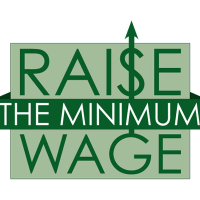As Congressional Republicans Block Raising Minimum Wage, States Take Over
 (graphic: National Women's Law Center)
(graphic: National Women's Law Center)
Despite the opposition of Congressional Republicans unwilling to deny a political victory to President Barack Obama by voting for an increase in the minimum wage, it’s increasing nonetheless for many workers. And Congress won’t get to claim even partial credit for it.
Seven states and the District of Columbia, tired of waiting for federal action, have moved to raise the minimum wage on their own since Obama first called for an increase in his 2013 State of the Union address. Legislatures are at least considering proposals to raise the minimum in 34 more states and others are attempting to get measures on the ballot in eight more states to raise their minimum wages.
Currently, the federally mandated minimum wage, set in 2009, is $7.25 an hour. There are 21 states plus the District of Columbia with minimum wages higher than that. In the other states and territories, employees work for the federal minimum.
Even where the states are doing the heavy lifting, the Obama administration’s taking some of the credit. “Presidential mobilization created the environment in which there is support for making change on the state level,” White House Communications Director Jennifer Palmieri said, according to the The New York Times. “We’re always looking for ways to break through.”
One reason opponents give for blocking attempts to raise the minimum wage is that it will cost jobs. Now, they might not have even that to fall back on. According to the Center for Economic and Policy Research (CEPR), jurisdictions that raised the minimum wage on January 1 saw employment increase by 0.28 percent from December through February. Employment remained steady in those states in which the minimum wage did not increase on New Year’s Day.
“Not only do we fail to find any evidence that minimum wage increases hurt state employment, we actually find the opposite. This exercise is far from definitive, but there is no obvious sign that a higher minimum wage is a ‘job killer,’” CEPR director of domestic policy Nicole Woo and domestic program intern Jeffrey Gianattasio wrote.
The federal minimum wage was first created in 1938. If the level that existed in 1968 was merely adjusted for inflation, it would be higher today than the amount President Obama has proposed: $10.10 an hour.
-Steve Straehley
To Learn More:
After Push by Obama, Minimum-Wage Action Is Moving to the States (by Michael D. Shear, New York Times)
Raising the Minimum Wage Does not ‘Kill Jobs’ – Preliminary Evidence from 2014 (by Nicole Woo and Jeffrey Gianattasio, Center for Economic and Policy Research)
Is a Higher Minimum Wage a Job Killer? Not in these States (by Aimee Picchi, CBS Moneywatch)
Minimum Wage Laws in the States - January 1, 2014 (U.S. Department of Labor)
25 Million Americans Earn Less than Obama’s Proposed Increased Minimum Wage (by Noel Brinkerhoff, AllGov)
3 of 4 Americans Approve of Raising Minimum Wage (by Noel Brinkerhoff and Danny Biederman, AllGov)
Minimum Wage, Factoring for Inflation, is Lower than in 1956 (by Noel Brinkerhoff, AllGov)
- Top Stories
- Unusual News
- Where is the Money Going?
- Controversies
- U.S. and the World
- Appointments and Resignations
- Latest News
- Trump Orders ICE and Border Patrol to Kill More Protestors
- Trump Renames National Football League National Trump League
- Trump to Stop Deportations If…
- Trump Denounces World Series
- What If China Invaded the United States?






Comments